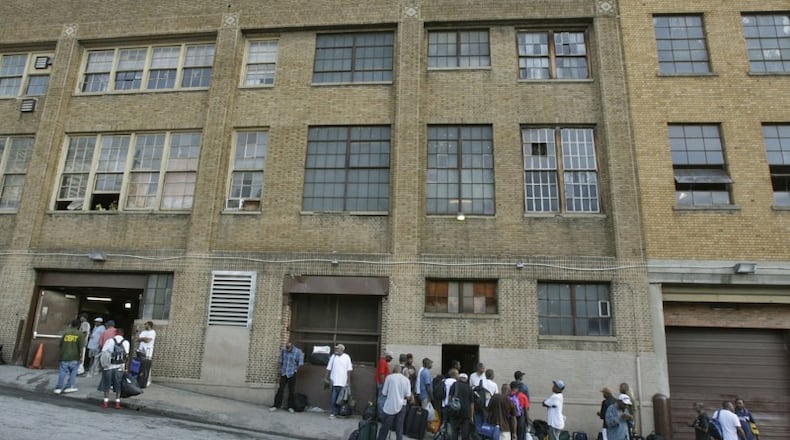Emory University has bought Peachtree-Pine, the now shuttered downtown Atlanta shelter that for years pitted homeless advocates against city and business leaders bent on ridding the city's premiere thoroughfare of blight.
Emory bought the 28,500-square-foot facility for $6.2 million from Central Atlanta Progress in a deal that closed Dec. 21.
The downtown Atlanta business group took ownership of the building in August 2016 after settling a lawsuit with the shelter. At one point, the facility housed as many as 500 men a night.
Robin Morey, Emory’s vice president for planning, said the university is still discussing how it will use the facility, and no decisions have been made on whether to keep the building or tear it down.
“This investment will make Emory’s resources more accessible to the greater Atlanta community,” Morey said. “It also will support our academic mission across the arts, the sciences and the humanities.”
VIDEO: Previous coverage of Peachtree-Pine
The sale is the latest and perhaps final chapter of a facility that was the bane of mayors and business leaders for years but a rallying point for homeless advocates who cheered shelter leaders’ resistance to City Hall’s eviction efforts.
Business groups complained that the hundreds of men who gathered around the facility throughout the day were a nuisance. Meanwhile, Mayor Kasim Reed campaigned to shutter the building, especially after it became ground zero for three separate tuberculosis outbreaks.
George Chidi, social impact director for CAP, said the building has been empty for the past year. Of the roughly 300 men who were using the facility when CAP took over, the group found homes for almost 200 of them. Fifty either found shelter with friends and family, while the remaining men refused help, he said.
Finding a buyer for the building was the natural next step.
“Central Atlanta Progress is not in the property owning business,” he said.
AJC SPECIAL REPORT: THE PEOPLE OF PEACHTREE-PINE
Part of the reason the building drew intense interest is its location. It’s on prime real estate at the corner of Pine and Peachtree streets, just blocks south of the Fox Theater, the Bank of American Building and the booming developments of Midtown.
It’s also right across from Emory’s Midtown hospital and just a few blocks south of the university’s new Proton Therapy Center for cancer patients. The university also owns two other smaller buildings in the same block as Peachtree-Pine.
Roger Tutterow, an economist for Kennesaw State University, said the Peachtree-Pine block was always sort of no-man’s land in development circles because of the shelter. Now that Emory has purchased it, he expects the block will enjoy the same redevelopment boom as much of the city.
“This represents a vote of confidence for this area,” he said.
Joe Beasley, a longtime member of the Metro Atlanta Task Force for the Homeless, which oversaw operations of Peachtree Pine before it was sold to CAP, said he was saddened by the news. He said homeless advocates, including Peachtree-Pine director Anita Beaty, fought as long as they could to keep the building, but they were eventually overwhelmed by a city that saw dollar signs in the real estate.
“Poor people deserve to be in all parts of the city,” he said.
About the Author
Keep Reading
The Latest
Featured



